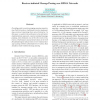Free Online Productivity Tools
i2Speak
i2Symbol
i2OCR
iTex2Img
iWeb2Print
iWeb2Shot
i2Type
iPdf2Split
iPdf2Merge
i2Bopomofo
i2Arabic
i2Style
i2Image
i2PDF
iLatex2Rtf
Sci2ools
104
click to vote
IPPS
2008
IEEE
2008
IEEE
Receiver-initiated message passing over RDMA Networks
Providing point-to-point messaging-passing semantics atop Put/Get hardware traditionally involves implementing a protocol comprising three network latencies. In this paper, we analyze the performance of an alternative implementation approach—receiver-initiated message passing—that eliminates one of the three network latencies. Performance measurements taken on the Cell Broadband Engine indicate that receiver-initiated message passing exhibits substantially lower latency than standard, sender-initiated message passing.
Distributed And Parallel Computing | IPPS 2008 | Message Passing | Message Passing Exhibits | Network Latencies |
Related Content
| Added | 31 May 2010 |
| Updated | 31 May 2010 |
| Type | Conference |
| Year | 2008 |
| Where | IPPS |
| Authors | Scott Pakin |
Comments (0)

